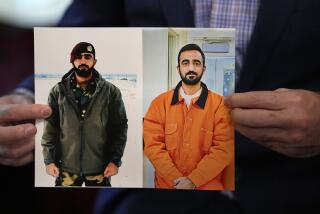Uruguayan backpacker, confused about visas, lands in U.S. detention
- Share via
A man from Uruguay who has been backpacking through North America and doing volunteer work along the way was trying to head to Canada on the last day of his U.S. visa — and ended up in a U.S. detention center instead.
Diego Farre Simonassi, 29, told the Los Angeles Times that he hadn’t realized he needed a Canadian visa to cross from Washington state into Canada the evening of June 14. By the time he found out Canada wouldn’t accept him, it was too late: He’d already officially left the United States, and in the confusion, too much time had passed. It was half an hour past midnight, and his U.S. visa had expired, his attorney said. The U.S. wouldn’t let him return.
“I say, am I arrested?” he recalled. “They say no, but when they say that, they are putting these things on my hands.”
Farre landed in Tacoma Northwest Detention Center near Seattle, where he stayed until being suddenly released Thursday, his attorney, Steve Tanijo, told The Times. Immigration and Customs Enforcement gave him 30 days to resolve his situation and leave the country, saying it “has chosen to exercise prosecutorial discretion.”
Tanijo, who said he took the case pro bono, accused the Customs and Border Protection agent who decided to detain Farre of being overzealous.
Customs and Border Protection spokesman Mike Milne said he could not discuss any specific case, but he indicated that the rules at the border were not always hard and fast.
When asked whether there was any wiggle room if a person’s visa had expired, say, half an hour earlier, he replied: “It’s generally you’re either admissible or you’re not,” later confirming that “generally” does not mean “always.”
On average, though, Customs and Border Protection processes about 1 million people a day and refuses entry to almost 400 of those, he said.
Farre told The Times that after traveling in Europe and in South America, where he could go from country to country without much paperwork, he simply did not think of needing a visa to go to Canada.
Now, Farre is hoping to secure a Canadian visa before his time in the U.S. expires again. If he cannot, he plans to head to Mexico, which allows Uruguayan nationals to enter without visas.
Farre said that in Uruguay he worked as a consultant to entrepreneurs and, later, to social and community projects. He has a business degree, he said, but wants to learn more about the nonprofit and voluntary sector — and finds traveling to be as educational as studying or working. “The balance is doing everything,” he said.
In the Northern California city of Mount Shasta, Farre spent time volunteering at a hot lunch program for senior citizens. Anne Rutherford, supervisor of the Mt. Shasta Senior Nutrition Project, told The Times that he helped cook, washed dishes and did odd jobs for the program free of charge.
For more news, follow @raablauren on Twitter.
More to Read
Sign up for Essential California
The most important California stories and recommendations in your inbox every morning.
You may occasionally receive promotional content from the Los Angeles Times.














